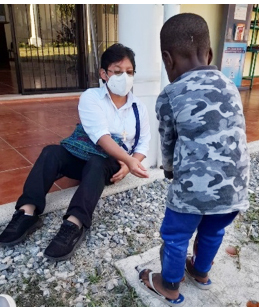 Jesuit Network with Migrants (RJM)
Jesuit Network with Migrants (RJM)
~ An account by Sr. Sonnia Margarita Osorio, MSC *
I have lived a very intense month, accompanying the caravan of Honduran migrants at the Aguas Calientes border between Honduras and Guatemala, accompanying a family in the process of [identifying] the body of their son, who was in the truck that crashed in Chiapas on December 19, 2021. The truck was carrying more than 150 migrants [as they were observing] the first anniversary of the 19 migrants killed in Tamaulipas on January 22, 2021. Of those 19, 14 were from Comitancillo San Marcos. On January 20 and 21 in San Marcos we had a Eucharist and inaugurated a mural in honor of the victims and their families, the mural represents the process of mourning and hope.
“I have seen the oppression of my people in Egypt and I have heard the cries of pain, I have seen the oppression of my people in Egypt and heard the cries of their oppressors; I know their sufferings…” Exodus 3, 7
With this text of the Exodus begins the prologue of the book “The Flight of the Hummingbird” which contains the review of each of the migrants killed and burned in Camargo Tamaulipas. It also narrates the process of accompaniment of mourning with their families made by the Network. I have had the grace of accompanying these families for some months in group processes. We have also taken the opportunity to visit each family, listen to them and encourage them. Further on, the same text says:
“I have come down to deliver you from the hand of the Egyptians and to bring you up from this land to a good and spacious land, to a land flowing with milk and honey…”.
This experience of celebrating the first anniversary of these victims of Tamaulipas, has a double reality and feeling, on the one hand, the joy that gives “the lowering of God to free his people” and the certainty that they come from the Gospel, where it is not the full and satisfied who enjoy the banquet of the Kingdom, but the strangers, those of the squares, the roads, the discarded, those who, like the Master, have nowhere to lay their heads.
The other reality is the indignation of seeing how the bodies of the victims of the “accident” in Chiapas continue to arrive, in which so many migrants, mostly Guatemalans, were traveling, and where we see that the blood of our brothers and sisters continues to cry out for justice. We are all brothers and sisters and we must eat at the same table because the earth belongs to all and produces for all.
“Hope multiplies strength a hundredfold,” says Mother Cabrini and I believe that this is a reality of the RJM team extended to our families and communities where lay and religious men and women live with joy the encounter with our brothers, Haitians, Venezuelans, Nicaraguans, Hondurans, and Guatemalans who with their courage challenge us to leave the comfort and always look for something better.
